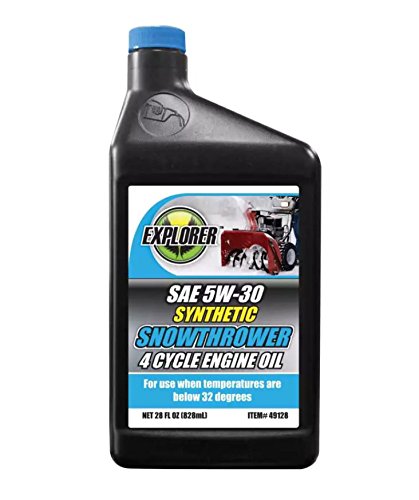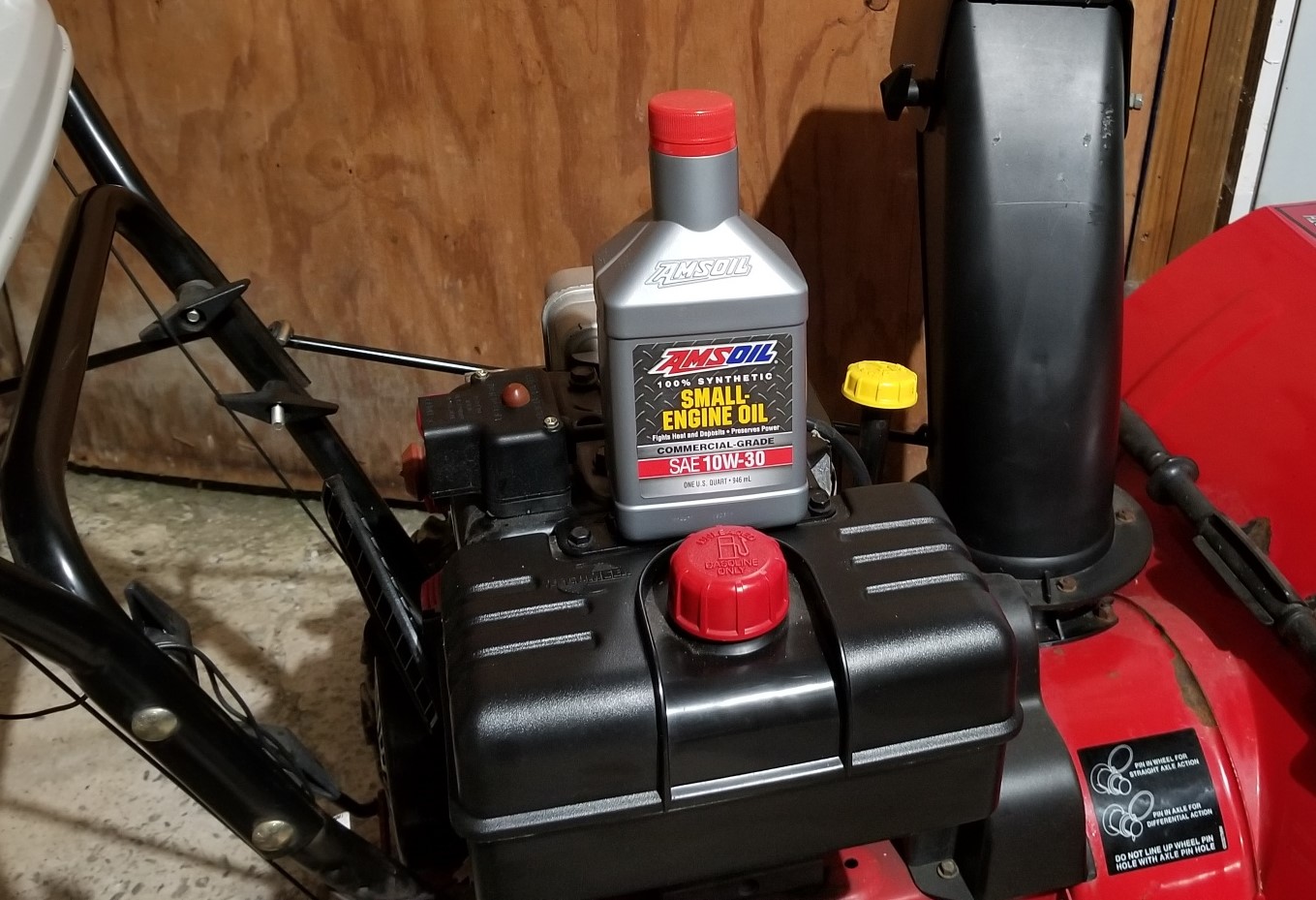If you’re wondering which type of oil to use for your snowblower, we’re here to help! In this article, you’ll learn about the differences between regular and synthetic oil for snowblowers, and which one may be best for your machine. We’ll discuss the benefits and drawbacks of each type, as well as provide some tips on how to choose the right oil for your specific snowblower. So, let’s dive in and find out which oil is the best fit for your snow-clearing needs! When it comes to selecting the right oil for your snowblower, the choice between regular and synthetic oil can be a bit confusing. Regular oil, also known as conventional oil, is derived from crude oil and typically contains additives to enhance its performance. On the other hand, synthetic oil is made through a chemical process that creates a more uniform and stable molecular structure. While both types of oil can work well in snowblowers, there are some differences to consider. Regular oil is generally more affordable and readily available, but it may not provide the same level of protection and performance in extreme cold temperatures as synthetic oil. Synthetic oil, although more expensive, has excellent cold-start capabilities and can offer enhanced lubrication and protection, especially in harsh winter conditions. Ultimately, the choice between regular and synthetic oil will depend on factors such as your budget, climate, and the specific requirements of your snowblower.
Understanding the Differences
Composition of Regular Oil
Regular oil, also known as conventional or mineral oil, is derived from crude oil. It undergoes a refining process to remove impurities and add specific additives to enhance its performance. Regular oil is composed primarily of hydrocarbon molecules, which provide lubrication and help to reduce friction in the engine.
Composition of Synthetic Oil
Synthetic oil, on the other hand, is artificially created in a laboratory. It is engineered to have a more precise molecular structure compared to regular oil. Synthetic oil is made of individual molecules that are more uniform in size and shape, resulting in improved lubrication properties and enhanced performance.
Performance Variations
The differences in composition between regular and synthetic oil directly impact their performance. Synthetic oil has several advantages over regular oil, including better resistance to high temperatures, improved cold-start capabilities, and enhanced engine protection. Regular oil, while still effective, may not perform as well under extreme conditions.
Pros and Cons of Regular Oil
Advantages of Regular Oil
Regular oil has been used in engines for decades and has proven to be reliable. It is readily available and often more affordable than synthetic oil. Additionally, regular oil is compatible with most engines and does not require any special considerations.
Disadvantages of Regular Oil
Regular oil tends to break down faster under high temperatures, which can lead to engine wear and decreased performance. It may also form sludge and deposits over time, requiring more frequent oil changes. Regular oil is also more susceptible to oxidation, which can lead to the formation of harmful by-products.
This image is property of cdn.yurishwedoff.com.
Pros and Cons of Synthetic Oil
Advantages of Synthetic Oil
Synthetic oil offers several benefits that make it a popular choice for many snowblower owners. It provides superior protection against engine wear, especially in extreme temperatures. Synthetic oil also maintains its viscosity over a longer period, reducing the need for frequent oil changes. It is also less likely to form sludge and deposits, resulting in a cleaner engine.
Disadvantages of Synthetic Oil
One of the main drawbacks of synthetic oil is its higher price point compared to regular oil. It may also not be compatible with all engines, especially older models. Synthetic oil can also cause leaks or seal damage in engines that have been running on regular oil for an extended period.
Considerations for Snowblower Engines
Engine Type and Manufacturer Recommendations
To determine whether regular or synthetic oil is suitable for your snowblower, it is crucial to consult the manufacturer’s recommendations. Different engines may have specific requirements regarding oil type and viscosity.
Climate and Temperature Effects
The climate and temperature where you operate your snowblower also play a significant role in choosing the right oil. Cold temperatures can cause regular oil to thicken, making it more difficult to start the engine. Synthetic oil, with its improved cold-start capabilities, may be a better choice for snowblowers used in colder climates.
Operating Conditions
Consider the operating conditions of your snowblower when selecting an oil. If you frequently operate your snowblower for extended periods or in harsh conditions, synthetic oil’s superior protection may be beneficial. Regular oil, on the other hand, may be sufficient for less demanding or occasional use.

This image is property of Amazon.com.
Regular Oil for Snowblower
Suitability in Cold Weather Conditions
Regular oil can still be used in snowblower engines, especially in milder climates or situations where the engine is not subjected to extreme cold temperatures for prolonged periods. However, it is essential to ensure the oil is of the correct viscosity for cold weather use.
Maintenance and Cost Aspects
Regular oil requires more frequent oil changes compared to synthetic oil. It is also more prone to oxidation and the formation of sludge and deposits. Therefore, proper maintenance and regular oil changes are necessary to ensure optimal performance and engine longevity.
Synthetic Oil for Snowblower
Improved Cold Weather Performance
One of the significant advantages of synthetic oil is its ability to flow more freely at low temperatures. This feature makes it an excellent choice for snowblowers used in colder climates. Synthetic oil provides better cold-start capabilities, reducing engine wear during start-up.
Longevity and Engine Protection
Synthetic oil has a longer lifespan compared to regular oil. It retains its lubricating properties for an extended period and is more resistant to breakdown under high temperatures. This increased durability helps protect the engine from wear and can lead to improved overall performance and longevity.

This image is property of www.buytoolbags.com.
Choosing the Right Oil
Snowblower Specific Recommendations
To ensure optimal performance and engine longevity, always refer to the snowblower manufacturer’s recommendations. These guidelines will provide information on the appropriate oil type, viscosity, and any specific requirements for your particular snowblower model.
Budget Considerations
While synthetic oil offers numerous advantages, it does come at a higher price compared to regular oil. If budget is a significant concern, regular oil may be a more cost-effective option, especially if you are not operating your snowblower under extreme conditions or for extended periods.
Changing the Oil
Steps to Change Regular Oil
To change regular oil in your snowblower, follow these steps:
- Allow the engine to cool down completely.
- Locate the drain plug and place an oil pan underneath.
- Remove the drain plug and drain the old oil into the pan.
- Replace the drain plug and remove the oil filter (if applicable).
- Install a new oil filter (if necessary).
- Refill the engine with the recommended amount and type of regular oil.
- Dispose of the used oil properly.
Steps to Change Synthetic Oil
The process of changing synthetic oil in a snowblower is similar to that of regular oil. Follow the same steps mentioned above, substituting synthetic oil for regular oil.

This image is property of cdn.aftonvilla.com.
Frequently Asked Questions
Can I Mix Regular and Synthetic Oil?
It is generally not recommended to mix regular and synthetic oil. Mixing the two types can alter the oil’s properties and reduce its effectiveness. It is best to stick to one type of oil for your snowblower.
How Often Should I Change the Oil?
The frequency of oil changes for snowblowers can vary depending on factors such as operating conditions, oil type, and manufacturer recommendations. Generally, it is advisable to change the oil at least once a season or every 25-50 hours of operation.
Can I Use Snowmobile or Motorcycle Oil Instead?
Snowmobile or motorcycle oil may have specific formulations designed for those particular engines and operating conditions. It is best to use oil specifically formulated for snowblower engines to ensure optimal performance and engine protection.
Conclusion
In conclusion, choosing between regular and synthetic oil for your snowblower depends on several factors, including engine type, operating conditions, and climate. While regular oil is still a viable option, synthetic oil offers superior engine protection, especially in extreme temperatures. However, it is essential to follow the manufacturer’s recommendations and consider your budget when selecting the right oil for your snowblower. Regular oil requires more frequent oil changes and may not perform as well under extreme conditions, but it remains a cost-effective choice for less demanding use. Ultimately, the decision between regular and synthetic oil should be based on your specific snowblower’s requirements and your operating conditions.

This image is property of i.ytimg.com.

